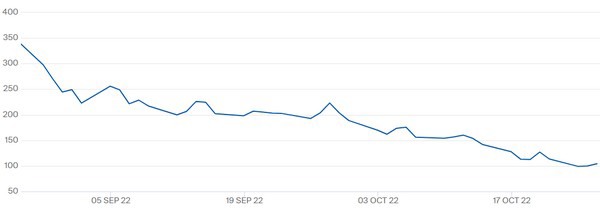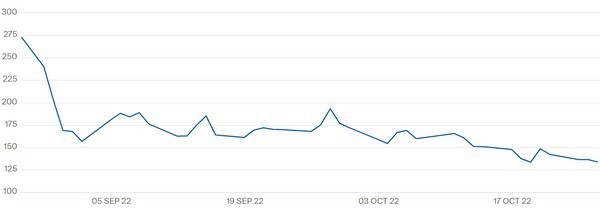Short-term gas prices continue to hover around the €100/MWh mark (for now). For the longer term, prices are still steadily declining. For next winter, the TTF gas price is just above €130. In this short crisis update, we will lay it all out.

The TTF gas price for November closed almost 5 euros higher on Wednesday than Tuesday. This morning the market opened at 98 euros before rising above the 100 euros per megawatt hour mark. View the current figures here.
Daily gas prices on the TTF are still a lot lower. Wednesday at 28.25 euros per megawatt hour. After that low level, the price did rise again by more than eight euros for delivery on 27 October, energy supplier Vattenfall pointed out in a market report.

TTF gas price for 'winter 2023' drops steadily
In the same market report, Vattenfall points out that gas prices for December and January were over 30 and over 40 euros higher, respectively than the price for November earlier this week. According to the energy analysts, because 'the tightness problem in winter has not yet been solved.'
On electricity prices, they noticed a huge difference between peak and off-peak prices. In January, peak hours cost 116.84€/MWh more (571.6 €/MWh) than off-peak hours (454.76 €/MWh). The explanation for this phenomenon is as follows: In the winter months, peak demand is mostly supplied by easily switched on and off gas plants. The tightness and hence high gas prices also drive up electricity prices. In summer, peak demand is depressed by solar generation, but since it is largely absent in winter, much heavier reliance is then placed on electricity from gas. Read the full market report here.
The NOS, like the FD and others earlier this week, dwells on an impending diesel shortage. Diesel at the pump is currently more expensive than petrol. In itself, there is enough oil in the world, and so there should also be enough diesel made, writes NOS. The shortage is caused by the fact that many refineries have already reduced imports of Russian oil and diesel in anticipation of the sanctions.
Shell turned in a good third quarter, Nu.nl points out. With a profit of 9.4 billion euros, it was the second-best quarter ever for the oil group. View Shell's quarterly figures here.
